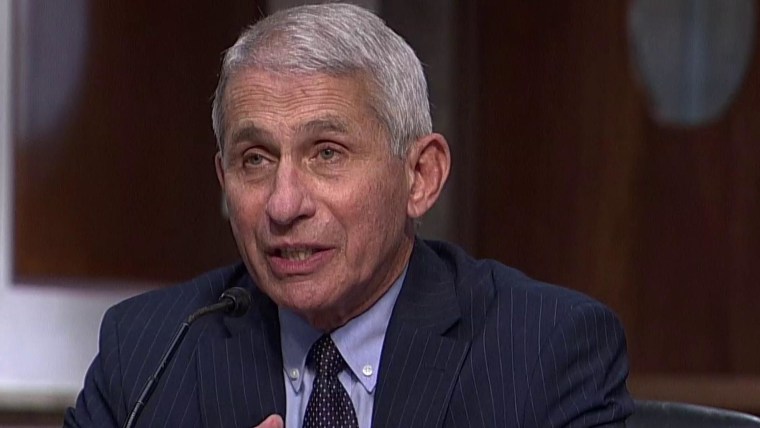COVID-19 cases could swell to 100,000 a day if U.S. doesn’t control virus
Dr. Anthony Fauci, one of the nation’s leading health officials, suggested Tuesday the number of COVID-19 cases diagnosed each day could rise dramatically unless the nation can control the spread of the coronavirus.
“I’m very concerned about what’s going on right now, particularly in the four states that are accounting for about 50 percent of the new infections,” Fauci, the director of the National Institute of Allergy and Infectious Diseases, told the Senate Committee on Health, Education, Labor and Pensions.
Full coverage of the coronavirus outbreak
Those states — Arizona, California, Florida and Texas — are experiencing surges in COVID-19 cases. And at least 12 states are reporting increases in COVID-19 hospitalizations.
“We are now having [40,000+] new cases a day. I would not be surprised if we go up to 100,000 a day if this does not turn around,” Fauci said. “Clearly we are not in total control.” He declined to make a prediction on the number of COVID-19-related deaths the U.S. could experience. More than 126,000 Americans have died from COVID-19, the disease caused by the coronavirus.
“I’m very concerned, because it could get very bad,” he said.
The testimony came during a hearing intended to address how the nation’s schools can safely reopen, even as many cities and states are pausing or reversing plans to open up the economy.
Many new COVID-19 infections are among young adults, and are largely linked to large gatherings.
The coronavirus spreads mainly from person to person through respiratory droplets from coughing, sneezing, talking and singing.
Health officials continue to urge everyone to do their part to control the spread, by washing hands, maintaining physical distance and wearing masks.
Download the NBC News app for full coverage of the coronavirus outbreak
“It is critical that we all take the personal responsibility to slow the transmission of COVID-19, and embrace the universal use of face coverings,” Dr. Robert Redfield, director of the Centers for Disease Control and Prevention, said during his testimony Tuesday.
“Specifically, I’m addressing the younger members of our society, the millennials and Generation Zs,” Redfield said.
Redfield’s urging for young people to employ behavioral strategies to slow the spread of COVID-19 came the same day the CDC released recommendations that universities not test returning students and faculty for the virus. The CDC said colleges should only test those who are showing symptoms, or who have had a known interaction with an infected individual.
But Adm. Brett Giroir, who is overseeing COVID-19 testing, said during the hearing that officials are looking at strategies to increase testing, “especially in universities.”
One suggestion is to pool testing samples. Rather than test one sample at a time, which can be time-consuming, scientists would put as many as 10 samples together in one test. If the test gives a negative result, it can be assumed all 10 are negative.
It’s only if the test is positive that scientists would have to test each sample to find which one is positive.
Tremendous hope for stopping the pandemic has been placed on a vaccine, and lawmakers pressed the health officials for a national plan. There are several vaccines in the U.S. under development and in clinical trials, although Fauci warned, “there is no guarantee we will have a safe and effective vaccine.” He added that he and other health officials remain “cautiously optimistic” they will have a good grasp of how well vaccine candidates work sometime this winter.
Also Tuesday, the Food and Drug Administration said companies would have to show that a vaccine is at least 50 percent more effective in preventing or reducing the severity of the disease than a placebo before approval and that diverse populations will be included in the trials, including minorities, the elderly and people with chronic health conditions.
Meanwhile, Fauci said elected and community leaders should be modeling good public health behavior by wearing masks, a behavior that has become a symbol of political division. President Donald Trump has generally refused to wear a mask in public.
Sen. Lamar Alexander, R-Tenn., made a point to encourage the president to wear a face covering. “The stakes are too high for the political debate about pro-Trump, anti-Trump masks to continue,” Alexander said at the hearing.
Follow NBC HEALTH on Twitter & Facebook.





